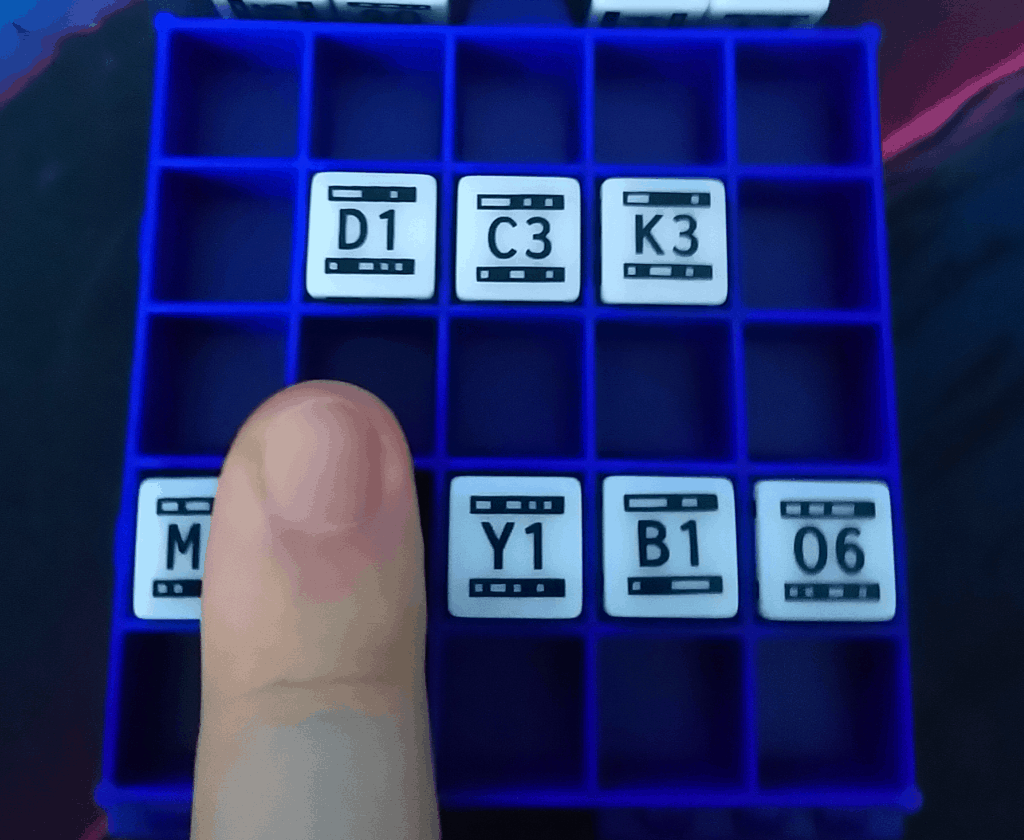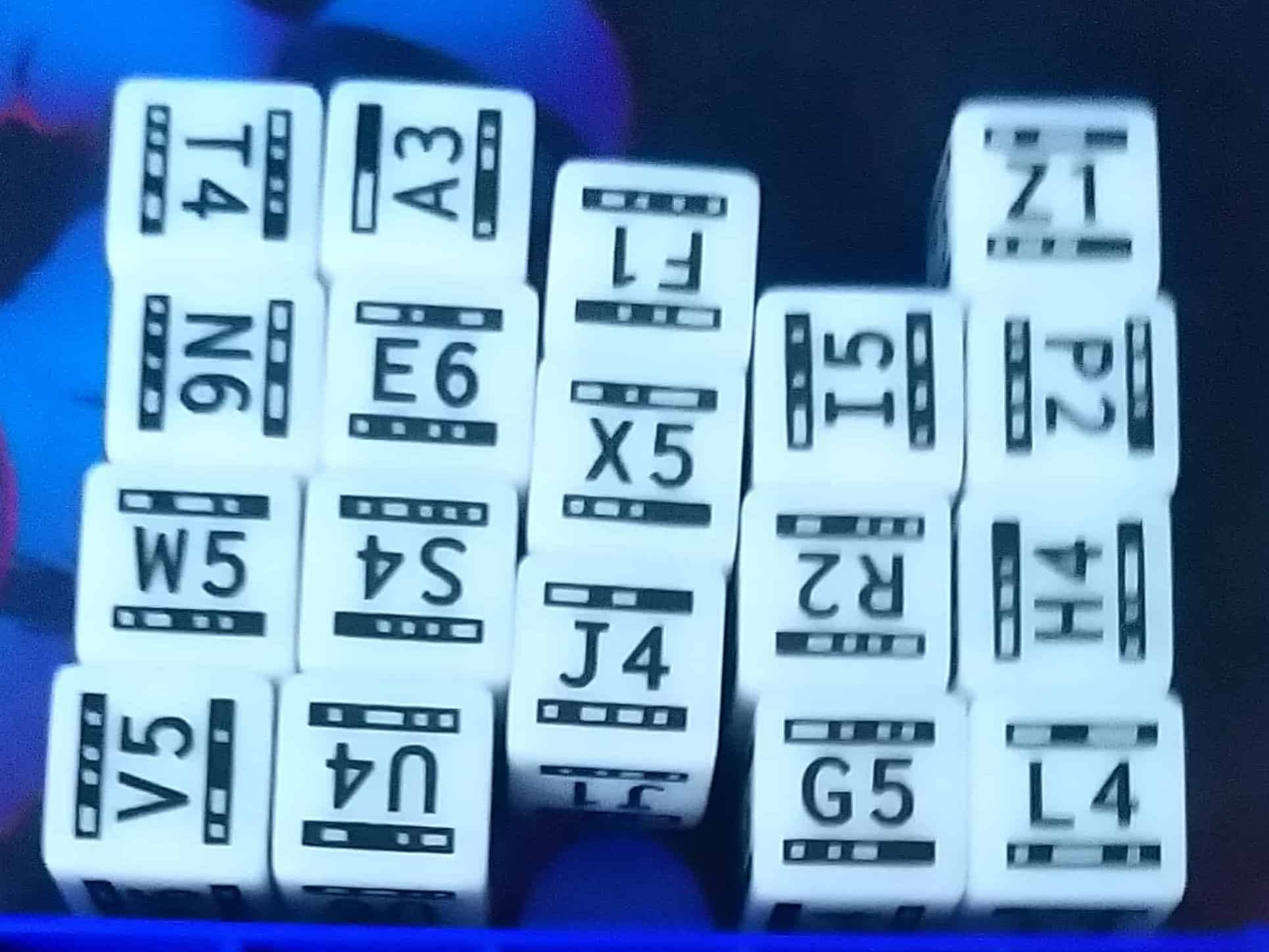Transparency disclaimer: I got this for free, but I am unbiased as always.
so I have seen the Dicekeys project for a while now and really liked thre idea and all, but for a vastly different reason than (or maybe rather just a part of) the reasoning the makers intended.
But first we need to answer the question, what IS the Dicekeys product in the first place, and what is it for?
So with Dicekeys you have 25 dice which each have one of the 26 letters of the alphabet to indicate which dice is which, however without Q (will be explained), a number from 1 to 6, which, in case it isnt already obvious, indicates which side the dice fell on, and also due to the way the dice have a letter and a number on them rather than just dots, they are also orientation aware. The fancy bars at the top and bottom are also digital representations of the faces, in order to make camera scanning easier.


Then you have a box which consists of 3 parts, the bottom part where you throw the dice in, a middle part with a grid and all to lock up the dice when you are finished rolling, and a lid to cover up your dice box when not in use, and in addition to that you also get a nice bag you can use both to mix up your dice and storing the dice box later.
After covering what you get with a Dicekeys set, the main question, what is this thing even used for? Simply said, the makers envision it as a way to generate and store a secret for long term, with their argument being that dice generally last VERY long, and obviously with the Dicekeys you have physically verifiable randomness, in fact even in the world of cryptocoins dice seem to be seeing a lot of favor when users want to generate their keys without relying on electronics that could have an accidentially weak (or actually evil) random number generator, both of which are things that actually exist. However, there are a few things that are a bit inaccurate when applied to Dicekeys. Mainly the argument about that dice last long can also be attributed to the borderline non-existent need for precision in general use dice as they just have dots for numbers and dont need to generate cryptographically random numbers (although their intended use is to be only rolled once so cannot give much fault on that), and also for the fact that the design is often more durable with corners severely rounded off and also with the numbers having indentations rather than just being painted on, which means you cant just scratch off the numbers. on the other hand sure the dice are sitting in a box which certainly is a valid counterargument but I wouldn't consider dicekeys overly resistant to extreme conditions.
In Fact I personally consider Dicekeys more as a convenient way to offline-generate random numbers rather than just using them once and chucking it away for all eternity (or at least until you need to restore). I think if you really want long term storage, you are better off with some metal solution where you either have pre-made plates you arrange in some jig, or for example punch in your results, literally. In fact one person I saw on a cryptocoin chat who used stamping tools, a bunch of washers and a wing nut to store the 24 word seed as a very cheap metal backup (and someone else blogging about it) as the metal plates or other metal-based backup solutions offered can get into money very quickly, which such a solution of plain stuff you can get from the next best hardware store are likely cost you less than 10€ at least for the consumables.
Also I think that literally the same can be done with dicekeys, where you can use the same wingnut method, but instead of seed words you hammer in the number of the dice 1-25 in western text order, the letter, number, and orientation. in fact the dicekeys are literally parsed by making a string consisting of the letter, the number and a letter denoting the orientation of each dice, so it very much fits as a backup method, and that would withstand a lot more abuse than a bunch of plastic dice in an equally plastic enclosure (which likely mels first with a fire, so even if the dice are unharmed, if they fall out you are a little lost.
One thing to note however is that the box is made to really not easily open when you closed it. For that reason I sheved down the "teeth" at the side of the top part that latches into the base so an ifixit pick is enough to open it but at the same note it doesnt just open that quickly either.
This allows me to roll up some entropy, keep it for a while if I want, also scan and print it for generating stuff off of it and have a quick backup, and discard it (the entropy, not the dicekeys set) later to roll up something new. and having this style of physically verifiable entropy (to the level that even a non-techncal person in perhaps their 90s would understand and could trust rather than some technical mubo-jumbo with thermal fluctuations and thinking they are not random etc, how dices fall is universally understood to be random and unpredictable in the real world
Conclusion
While I think there isn't much to conclude over here, the best way I can summarize this is that even if you don't think that a product works in the way it is intended to, it can be a whole lot better for different use cases (I think people playing tradińg card games know this feeling too well)
